What are the treatments for Rheumatoid Arthritis? Inflammations of the joints occur in patients at the onset and the development of arthritis. Inflammation is a process the body goes under wherein the body’s white blood cells along with its immune protein assist in giving us protection from foreign elements such as; viruses and bacteria. This is how our bodies help in shielding us from infections.
What are the treatments for Rheumatoid Arthritis? However, in some diseases; the immune system of a person, or its defense system; sets off an inflammatory signal even when foreign substances are absent. Conditions as these are called autoimmune diseases. This is when the immune system creates havoc over its own tissues responding as if healthy tissues were in a state of infection.
Misdirected inflammation is the outcome of some types of arthritis like Psoriatic arthritis, rheumatoid arthritis, gout, and systemic lupus erythematosus. What are the treatments for Rheumatoid Arthritis? Before we do that, let’s first take a look at the symptoms of arthritis.
Symptoms of Rheumatoid Arthritis
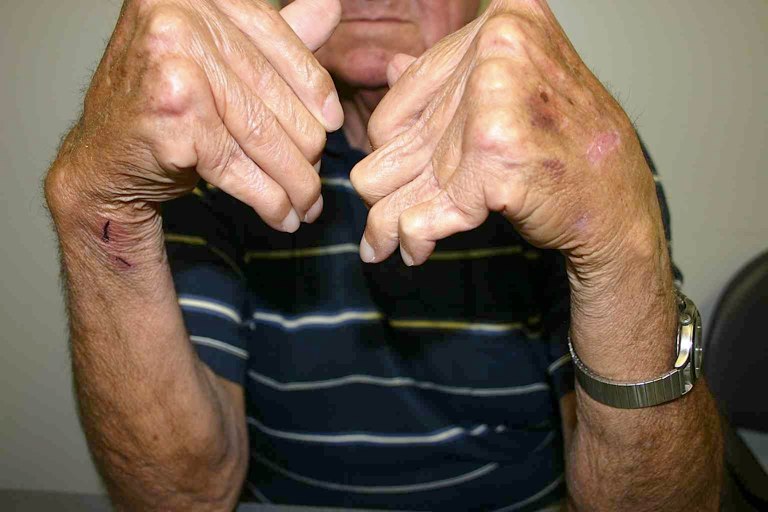
Also known as rheumatoid disease is one sort of inflammatory arthritis that is accompanied by chronic joint swelling. It typically manifests on the joints of an arthritic patients hands, knees, feet, and hands. Rheumatoid arthritis affects the entire system impacting the body’s organs. Patients who suffer from rheumatoid arthritis experiences a myriad of physical symptoms such as swelling, redness, tenderness, warmth; and stiffness of the patient’s joints causing severe pain. The motion and movability of the joints are compromised making the patient compensate on their movements by limping. More than one joint is usually involved. If left unchecked and untreated joints will begin to show deformity and the proper function; and task of the joint/s diminishes. Rheumatoid arthritis is also accompanied by fatigue, fever, and anemia.
How to Treat Rheumatoid Arthritis?
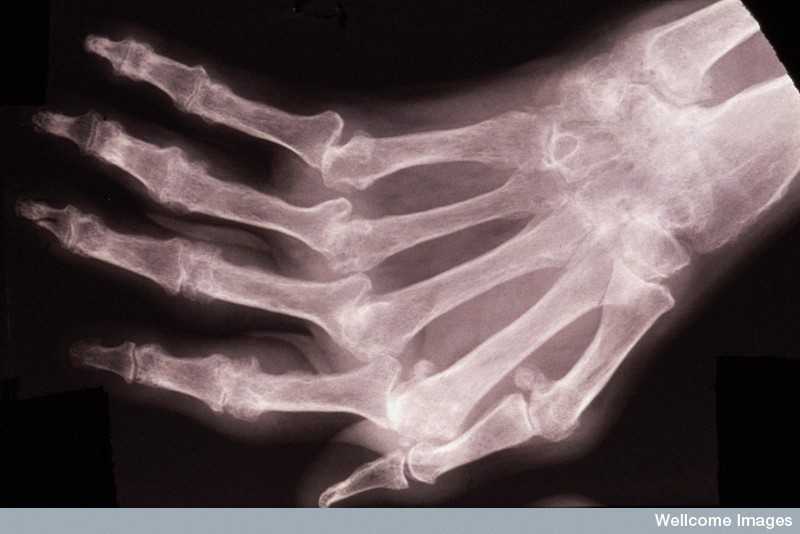
What are the treatments for Rheumatoid Arthritis? Some people are prone to developing arthritis more than others; and this can depend on a few things like family history, lifestyle and previous injury. Arthritis can change the way the person lives because of the pain that comes along with the condition. Early detection and proper diagnosis are ways to improve and manage the occurrence and gravity of arthritis. It is important for a person with the disease to understand the importance of switching up the way they eat work and live in order to gain a better handle on the condition.
There are a number of avenues a doctor and patient can take in order to manage the pain of living with arthritis. However it is important that both physician; and patient are rigid in following certain arthritis treatment options in order for the suffering patient to feel the positive benefits of treatment.
Medications
What are the treatments for Rheumatoid Arthritis? Over-the-counter painkillers can help manage the pain brought about by ice right this for short periods of time especially during flare ups. Some of the more common Pain relievers are ibuprofen, acetaminophen and Naproxen. These are good choices for short-term relief from arthritis pain however you should always consult with your doctor about the amount of pain relievers that you take; and how often you should take them. Should you be taking them for a long period of time it may be necessary to talk about joint replacement surgery. You may also discuss Cortisone shots that could be helpful for short term flare ups.
Gout medications are recommended when it is tolerated by the individual however like most other medications in the market that is given to patients these drugs have potential side effects. Side effects may include allergic rash symptoms; such as diarrhea and nausea as well as abnormal blood counts and muscle weakness. Some medications can exacerbate and worsen the kidney stones while others can cause irritation of the stomach lining and develop ulcers in some patients.
Medications for RA
Check out these specific medications for your Rheumatoid Arthritis below:
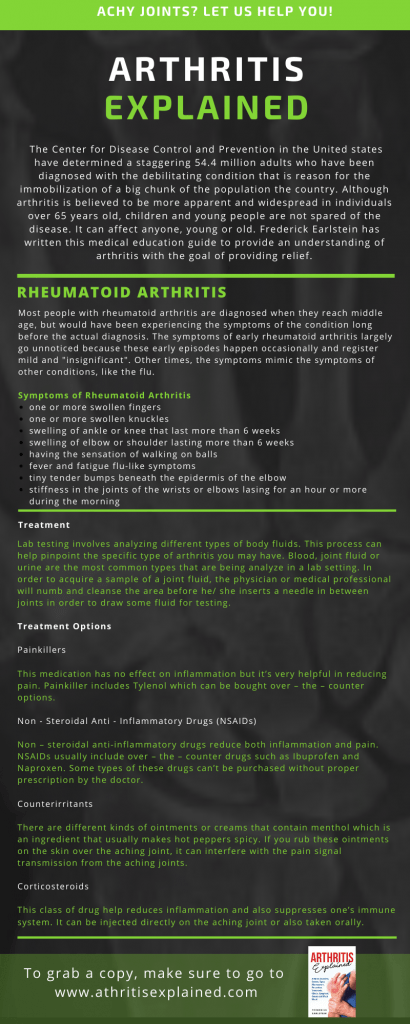
Arthritis Therapy
Stretching is a good way to keep a person, suffering from arthritis, flexible. Now only does it why flexible it also improves the patient’s range of motion; and the way you can move your joints. This also is beneficial because it helps the patient decreased the odds of injuries and pain caused by arthritis.
Make sure that you always start your exercises and workouts with a five minute warm-up walk. After this you may lie on your back; and stretch your hamstrings by looping a bitch around your phone using the sheet to help pull the leg straight up in the air. Hold this for at least 20 seconds then lower the leg you should take this twice on both legs.
You may want to consider the traditional Chinese medicine of acupuncture; which involves insertion of find needles to certain target points on the body which can help alleviate pain and manage it.
Exercise
Make it a point to shed pounds if you are overweight or obese. The extra weight that we carry puts a lot of pressure on the joints; and on the protective cartilage that acts as padding between the joints. Losing weight will help take away the stress from your hips and knees. Every pound lost removes 4 pounds of pressure that is put on the knees that affects the patient.
Losing weight lessons the wear and tear in the joint and may actually slow the progress of arthritis. For every 10 pounds that is lost relief is felt because it will reduce the pain by at least 20%. Exercising is important in order to slow down the deterioration that is happening within the body; and causing the pain of arthritis. The pain it still may make the individual hesitant to exercise and workout. But research has shown and proven that the stiffness; and pain caused by arthritis only gets worse when a person is inactive.
Exercising regularly will get the heart pumping and will increase the blood flow in the body. Increased blood flow allows the cartilage to stay well – nourished and function properly. And as an extra benefit exercising helps the individual attain a healthy weight; in order to keep in shape and manage the pain of arthritis. Staying as active as possible is very important make sure that your activity is something that is suited for you; and approved by your doctor. Avoid high impact activities such as running and jumping. It is best to choose exercises that are low impact like brisk walking cycling and swimming.
Other Treatment Options for Rheumatoid Arthritis
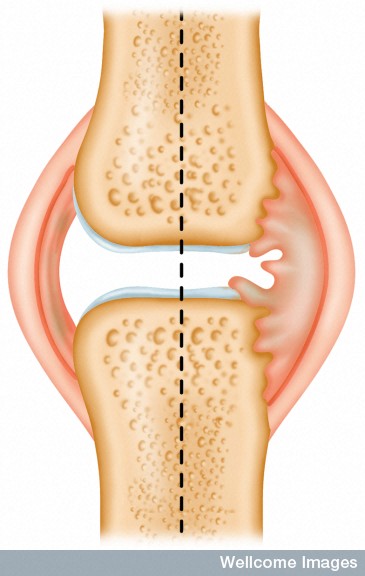
If you have been taking anti-inflammatory medications and pain relievers for an extended period of time it may be wise to talk to your doctor about joint replacement surgery. The problem with prolonged use of anti-inflammatory drugs is that these medications can take a toll on your liver.
If you still experience a lot of pain and difficulty getting out of bed in the morning or if your knee remains swollen; and has started to bow, the symptoms may indicate that you may possibly need knee replacement surgery. Although the most typically replaced joint in the body is the need this does not mean that your orthopedic surgeon will make this decision for you on the whim.
Replacement Surgery
Knee replacement surgery is not taken lightly and the process begins with the doctor determining the medical history of the patient making sure to know they have the information about your general health and the specifics of the pain you experience on the me; and most especially how arthritis affects your quality of life.
Your doctor will recommend tests in order to find out the alignment of your leg the stability, strength and motion of your knees. An X-ray will give the surgeon a better inside of whether the bone is deformed or damaged. And accompanying MRI gives the surgeon a more detailed look into the soft tissues surrounding your knee; and a deeper look into the bone and cartilage itself. Blood tests and laboratory exams are possible procedures that a patient of arthritis will have to undergo in order to rule out or identify other reasons; and causes for the pain experienced in the knees.
Should the physician decide to proceed with the total knee replacement he will be given detailed information about the possible problems and risks that entail the surgery. You will also be given information on what to expect after surgery; and what you need to do in order to maintain the knee replacement. The first order of business that the doctor will discuss with the patient would be to lose any extra poundage that the patient may be carrying to alleviate some of the stress that is being experienced by the knees.
Change Your Lifestyle
What are the treatments for Rheumatoid Arthritis? Aside from giving advice to lose weight doctors will also investigate what sort of food a patient with rightists usually has. Diet plays a big factor in the development of arthritis in persons between the ages of 30 to 50 years old. Therefore indulging in foods that promote arthritis will need to be avoided in order to see the positive results of the treatment. Since gout is commonly linked with obesity, significant weight loss can improve the management of the condition dramatically. Reducing calorie intake is a good way to shed pounds.
Diet Change
Doctors would usually recommend a diet that is low in saturated fat. They would normally recommend the replacement of refined carbohydrates like white bread potatoes and sugar with complex carbohydrates like whole grains and vegetables which help reduce the serum uric acid.
The doctor will strongly advise the patient to avoid frequent consumption of red meat and seafood. Avoidance of liquor and beer consumption will also be strongly recommended by the physician since alcoholic beverages increase the risk of gout. Aside from alcoholic beverages increasing the risk of a gallon sweetened beverages that is high in fructose corn syrup also heightens the possibility of the development of gout. And because that is a chronic condition if left untreated the patient may experience repeated painful and immobilizing acute flare ups of gout.
Complications of doubt may develop if it is not treated and eventual joint damage will be a parent and leave the patient immobilized with their quality of life compromised. Some of the risk factors of gout is hereditary and genetic and these make a predisposition for gout and preventable. However other risk factors can be curbed, like obesity diet and lifestyle.
Physical Therapy

With the help of a physical therapist you can work on targeting the weak spots that has been bothersome and painful and importantly can improve not only the balance but also the strength and joint alignment of the patient. Since arthritis has no known cure yet constant research is being done in order to provide more detailed guidance on how to treat people with arthritis. And arthritis patient has to take the responsibility of understanding their condition in order to avoid events that may cause further damage to their joints and most especially the cartilage.
What are the treatments for Rheumatoid Arthritis? Making it a point to build a strong understanding of how arthritis affects the body and the options available in terms of treatment and therapy is the best strategy for coping and managing arthritis. Learn more about the disease including things that you need to avoid doing so as not to worsen the condition.
Conclusion
Knowing the symptoms of arthritis can greatly help in arresting whatever damage is being caused to the cardiologist and bones of the individual. Recognizing the signs and indications that point to arthritis can power an individual to get help from a doctor to get proper diagnosis in order to find the best possible treatment for the sort of arthritis they suffer from. Apart from going to a doctor getting all the possible tests and getting the proper diagnosis it is the responsibility of the individual suffering from arthritis to understand the disease so that they are better able systems live a lifestyle that makes it possible for them to carry out your daily tasks and routine.
For more info about alternative treatments and therapies you can do to manage your Rheumatoid Arthritis, check out the video below:

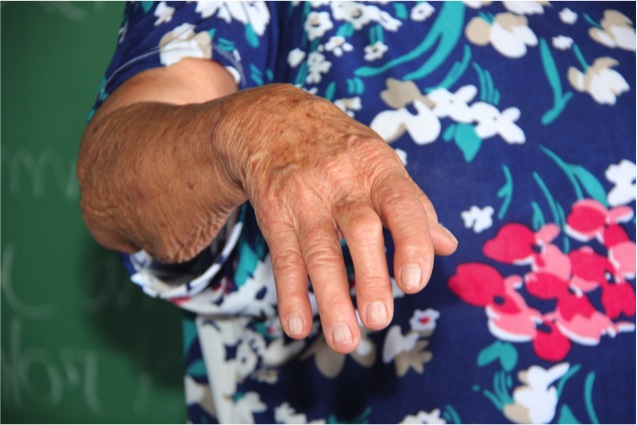
 I love to write medical education books. My books are written for everyone in an easy to read and understandable style.
I love to write medical education books. My books are written for everyone in an easy to read and understandable style.